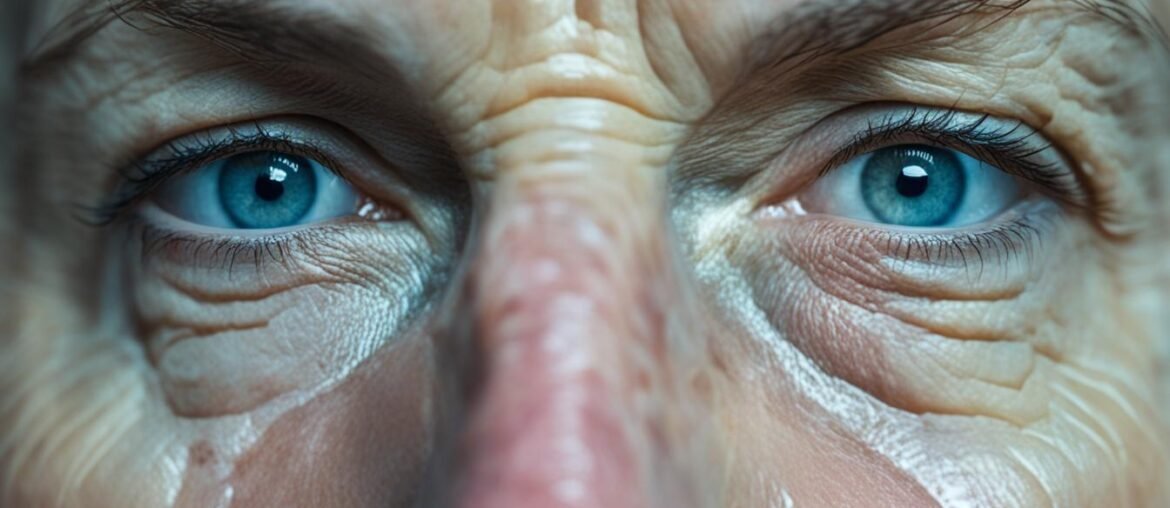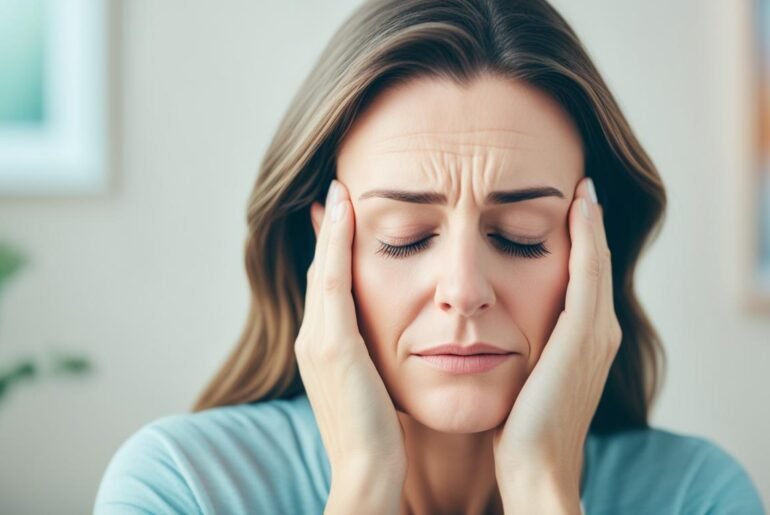Did you know that stress can accelerate the aging process of your skin?
Chronic stress can have a profound impact on your skin, leading to premature aging and the development of fine lines, wrinkles, and sagging. The effects of stress on the skin go beyond surface-level concerns, as it triggers hormonal changes, inflammation, and oxidative stress, all of which contribute to the breakdown of collagen and elastin, the proteins responsible for maintaining the skin’s elasticity and firmness.
In this article, we will explore how stress affects your skin’s health and appearance, the role of stress hormones and inflammation in premature aging, and effective strategies for managing stress to promote younger-looking skin. By understanding the relationship between stress and skin aging, you can take proactive steps to protect your skin and maintain its youthful appearance.
Key Takeaways:
- Chronic stress can accelerate the aging process of the skin.
- The release of stress hormones and chronic inflammation contribute to premature skin aging.
- Shorter telomeres, a marker of biological aging, are associated with chronic stress.
- Managing stress through stress reduction techniques and a healthy lifestyle can help slow down the signs of premature skin aging.
- A good skincare routine and seeking professional help for stress management can further support skin health.
The Impact of Stress Hormones on Skin Aging
Stress hormones play a significant role in the aging process of the skin. Among these hormones, cortisol and adrenaline have been closely associated with skin aging and its various manifestations.
The release of stress hormones, particularly cortisol, can have detrimental effects on the skin. High levels of cortisol in the body have been linked to a decrease in collagen production, impairing the skin’s ability to maintain its elasticity and firmness. This leads to the formation of wrinkles and sagging skin, which are characteristic signs of aging.
Furthermore, cortisol can hinder the healing process of wounds, delaying the skin’s recovery and potentially leaving behind scars or blemishes. The breakdown of collagen and elastin, crucial proteins that provide structural support to the skin, is also accelerated by increased cortisol levels. As a result, the skin loses its strength and resilience, further contributing to the aging process.
Another stress hormone that affects skin aging is adrenaline. Aside from its well-known role in the body’s stress response, adrenaline can also trigger inflammation and oxidative stress. These processes can disrupt the skin’s natural balance and accelerate the aging process. Inflammation can lead to redness, irritation, and the breakdown of collagen and elastin. Oxidative stress, caused by an imbalance between free radicals and antioxidants, can damage the skin’s cells and contribute to the appearance of wrinkles and other signs of aging.
In summary, the impact of stress hormones on skin aging cannot be ignored. Cortisol and adrenaline, in particular, can disrupt the skin’s structure and impair its ability to regenerate and repair. Understanding the role of these hormones is crucial in developing effective strategies to combat premature aging and maintain youthful-looking skin.
Signs of Skin Aging Associated with Stress Hormones
| Signs of Skin Aging | Description |
|---|---|
| Wrinkles and fine lines | Increased breakdown of collagen and elastin due to high cortisol levels |
| Sagging skin | Decreased collagen production and loss of skin elasticity caused by cortisol |
| Delayed wound healing | Inhibited skin regeneration and repair process due to elevated cortisol levels |
| Inflammation | Triggered by adrenaline, leading to redness, irritation, and collagen breakdown |
| Oxidative stress | Imbalance between free radicals and antioxidants, damaging skin cells and promoting aging |
The Role of Inflammation in Stress-Induced Skin Aging
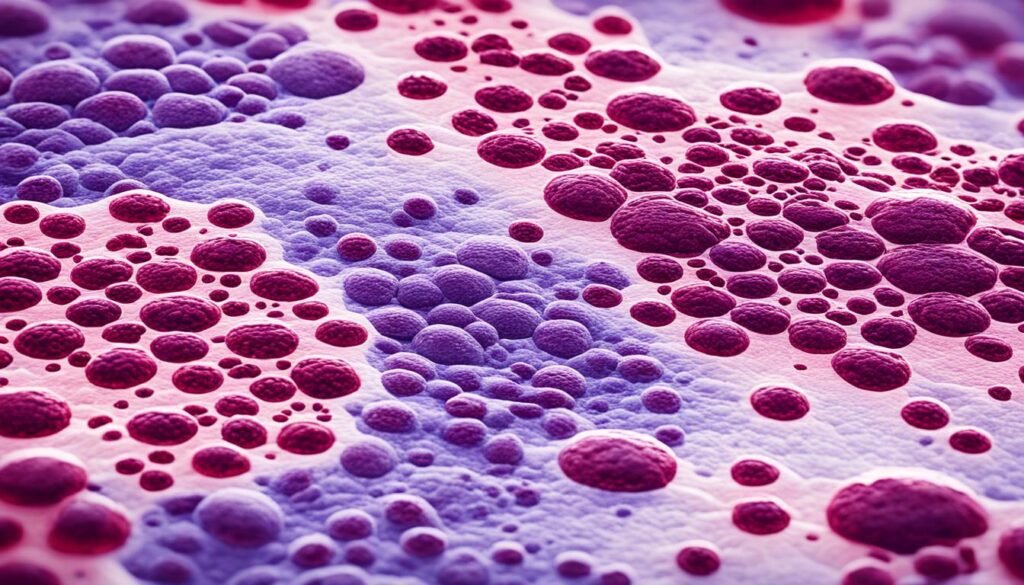
When it comes to stress-induced skin aging, inflammation plays a significant role. Chronic stress can trigger inflammation in the body, which in turn contributes to the aging of the skin. Inflammatory markers, such as cytokines, tend to increase in response to stress, leading to damage to the skin cells and an acceleration of the aging process.
Furthermore, oxidative stress, caused by an imbalance between reactive oxygen species (ROS) and antioxidants in the body, is another result of stress that can contribute to premature skin aging. The excess ROS can cause damage to cells, proteins, and DNA, leading to the breakdown of collagen and elastin, which are responsible for maintaining the skin’s firmness and elasticity.
In order to understand the impact of inflammation and oxidative stress on skin aging, let’s take a closer look at their effects:
Inflammation and Skin Aging:
Inflammation is the body’s response to harmful stimuli, such as stress. However, chronic inflammation can have detrimental effects on the skin. Continuous inflammation can disrupt the skin’s natural healing processes and impair the production of collagen and elastin. This can result in the formation of wrinkles, sagging skin, and an overall dull complexion.
Oxidative Stress and Skin Aging:
Oxidative stress occurs when there is an imbalance between the production of free radicals, or ROS, and the body’s ability to neutralize them with antioxidants. Free radicals are highly reactive molecules that can cause damage to cellular structures, including proteins, lipids, and DNA. In the skin, oxidative stress can lead to a decrease in collagen production and increased collagen breakdown, resulting in the appearance of fine lines, wrinkles, and loss of elasticity.
To better understand the impact of inflammation and oxidative stress on skin aging, refer to the table below:
| Inflammation and Skin Aging | Oxidative Stress and Skin Aging |
|---|---|
| Increased production of cytokines Damage to skin cells Acceleration of aging process |
Decreased collagen production Increased collagen breakdown Formation of fine lines and wrinkles |
As shown in the table above, inflammation and oxidative stress can both contribute to the aging of the skin. The continuous release of inflammatory markers and the presence of free radicals can lead to visible signs of aging, such as wrinkles, sagging skin, and a loss of elasticity.
It is crucial to manage stress and reduce inflammation and oxidative stress in order to maintain healthy and youthful-looking skin. In the following sections, we will explore various stress reduction techniques, lifestyle factors, and skincare approaches that can help combat stress-induced aging and promote optimal skin health.
Telomeres and Stress-Induced Aging
Chronic stress can have a profound impact on the aging process at a cellular level. One important factor that plays a role in stress-induced aging is the length of telomeres, which are protective caps on the ends of chromosomes.
Telomeres and skin aging:
Telomeres gradually shorten as cells divide and the body ages. However, studies have shown that chronic stress can accelerate this process, leading to shorter telomeres at a younger age. Shortened telomeres are considered a marker of biological aging and have been linked to an increased risk of age-related diseases.
Furthermore, stress-induced activation of an enzyme called telomerase has been found to play a crucial role in maintaining telomere length. Telomerase helps protect telomeres from shortening, potentially slowing down the aging process.
Research has shown that long-term stress can increase telomerase activity, providing a mechanism for telomere maintenance and potentially mitigating the effects of stress-induced aging.
Although the exact mechanisms and interactions between stress, telomeres, and telomerase are still being explored, these findings suggest that managing stress levels could have important implications for promoting healthy aging and reducing the risk of age-related conditions.
Next, we will delve into the impact of stress reduction on skin aging and explore various techniques and lifestyle changes that can help combat stress-induced aging.
Impact of Stress Reduction on Skin Aging
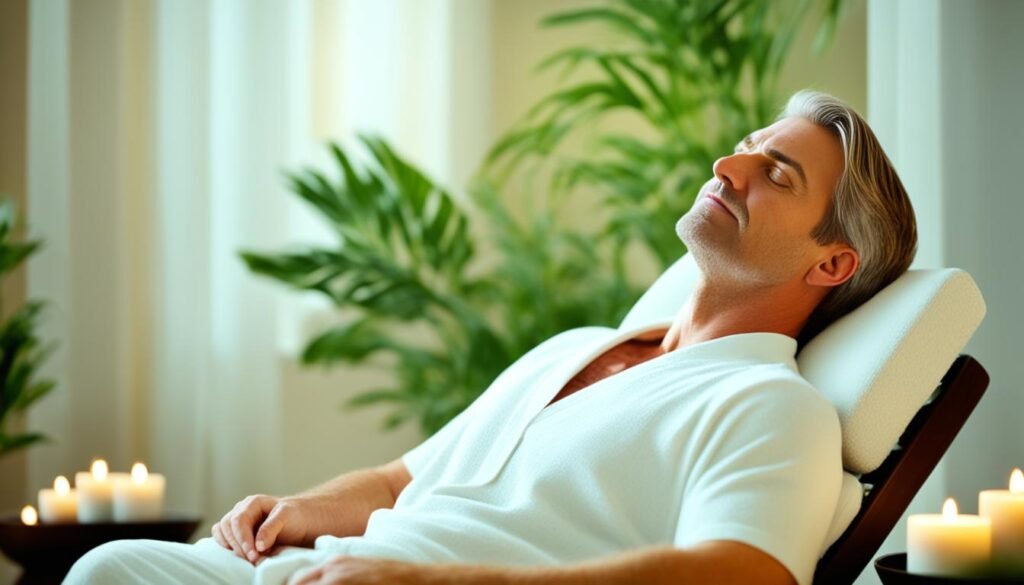
Managing and reducing stress can have a significant impact on skin aging. By incorporating stress reduction techniques into your daily routine, you can help improve the health and appearance of your skin.
Mindfulness Meditation
Practicing mindfulness meditation is a powerful stress reduction technique that has been shown to lower stress hormone levels, including cortisol, which can contribute to premature skin aging. By focusing on the present moment and letting go of negative thoughts and worries, you can reduce stress and promote a sense of calm and relaxation.
Exercise
Regular exercise is not only beneficial for your overall health but also for your skin. Engaging in physical activity helps increase blood circulation, delivering vital nutrients and oxygen to the skin cells and promoting a healthy, youthful glow. Exercise also triggers the release of endorphins, which are natural mood boosters that can help reduce stress.
Adequate Sleep
Getting enough sleep is essential for managing stress and promoting younger-looking skin. During sleep, the body repairs and regenerates itself, including the skin. Lack of sleep can disrupt the body’s natural healing processes, leading to increased inflammation and accelerated aging. Aim for 7-9 hours of quality sleep each night to support optimal skin health.
Finding Joy and Relaxation
Engaging in activities that bring you joy and relaxation is another effective way to manage stress and combat skin aging. Whether it’s spending time with loved ones, pursuing hobbies, or practicing self-care activities like taking a warm bath or reading a book, finding moments of happiness and relaxation can help counteract the negative effects of stress on the skin.
By incorporating these stress reduction techniques into your lifestyle, you can help lower stress hormone levels, reduce inflammation, and promote overall skin health. Remember, managing stress is a key component of maintaining a youthful appearance and supporting healthy, glowing skin.
| Stress Reduction Technique | Benefits |
|---|---|
| Mindfulness Meditation | Lowers stress hormone levels, promotes relaxation |
| Exercise | Increases blood circulation, reduces stress |
| Adequate Sleep | Supports skin repair and regeneration |
| Finding Joy and Relaxation | Counteracts negative effects of stress on the skin |
Note: The table above provides a summary of stress reduction techniques and their benefits for skin aging.
Lifestyle Factors for Healthy Skin Aging
Adopting a healthy lifestyle is crucial for maintaining younger-looking and healthier skin. There are several key factors that contribute to optimal skin aging. These include:
Diet and Skin Aging
A well-balanced diet plays a significant role in supporting skin health and reducing oxidative stress. Consuming foods rich in antioxidants, vitamins, and minerals can help protect the skin from damage caused by free radicals. Antioxidants, such as vitamin C, vitamin E, and beta-carotene, help neutralize free radicals and promote skin rejuvenation.
“A nutrient-rich diet is essential for a healthy and glowing complexion. Foods like berries, leafy greens, fatty fish, and nuts are excellent choices to incorporate into your diet for their skin-nourishing benefits.”
In addition, a diet that includes collagen-boosting foods, such as bone broth and lean protein, can support collagen production and improve skin elasticity. It is important to stay hydrated by consuming an adequate amount of water throughout the day, as hydration is essential for maintaining optimal skin health.
Exercise and Skin Health
Regular exercise not only benefits your overall health but also promotes skin health. Physical activity improves blood circulation, delivering oxygen and nutrients to the skin cells, resulting in a healthy, radiant complexion. It also stimulates collagen production, which helps maintain skin elasticity and reduces the appearance of fine lines and wrinkles.
“Incorporating exercise into your routine can give you a natural and healthy glow. Whether it’s brisk walking, yoga, or weightlifting, staying active helps to maintain the vitality and youthfulness of your skin.”
Exercise also aids in stress reduction, as it triggers the release of endorphins, our body’s natural feel-good hormones. By reducing stress levels, exercise indirectly contributes to healthier skin by reducing the production of stress hormones that can contribute to premature skin aging.
Adequate Sleep and Stress Management
Getting enough sleep is crucial for skin rejuvenation and overall well-being. During sleep, the body repairs and regenerates tissues, including the skin. Lack of sleep can lead to increased cortisol levels, which can negatively impact collagen production and contribute to skin aging.
“A restful night’s sleep is like a mini-facial while you’re snoozing. Prioritize sleep as part of your beauty routine to wake up with smoother, more vibrant skin.”
Additionally, managing stress is essential for healthy skin aging. Chronic stress can lead to inflammation and oxidative stress, which contribute to premature skin aging. Incorporating stress-management techniques such as meditation, deep breathing exercises, and engaging in activities that promote relaxation can help reduce stress levels and promote skin health.
| Lifestyle Factors | Effects on Skin Aging |
|---|---|
| Diet rich in antioxidants, vitamins, and minerals | Supports skin health, reduces oxidative stress |
| Regular exercise | Improves blood circulation, stimulates collagen production |
| Adequate sleep | Allows for skin repair and regeneration |
| Stress management | Reduces inflammation and oxidative stress |
The Importance of Skincare in Combating Stress-Induced Aging
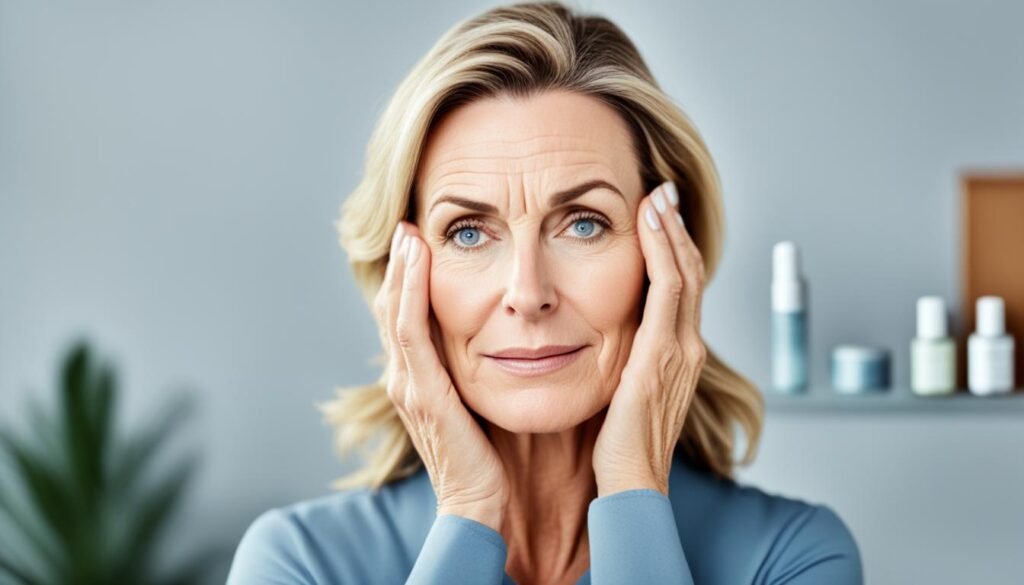
In addition to lifestyle factors, a good skincare routine plays a crucial role in managing stress-induced aging. Taking care of your skin with the right products and techniques can help combat the effects of stress on your skin and promote a youthful, rejuvenated appearance.
Using skincare products that contain antioxidants is key to protecting your skin from stress-induced damage. Antioxidants, such as vitamin C and green tea, help neutralize harmful free radicals and reduce oxidative stress. Look for serums and moisturizers that are formulated with these powerful antioxidants to boost your skin’s defenses against stress-related aging.
Another essential ingredient to look for in your skincare routine is hyaluronic acid. This hydrating powerhouse helps maintain skin moisture and plumpness, which can be compromised by stress. By keeping your skin well-hydrated, you can minimize the appearance of fine lines and wrinkles, helping your skin look smoother and more youthful.
Retinol is another effective ingredient in combating stress-induced aging. It helps stimulate collagen production, which naturally declines with age and is further accelerated by stress. By incorporating retinol-based products into your skincare routine, you can promote collagen regeneration and improve the elasticity and firmness of your skin.
In addition to using the right products, incorporating stress-relieving skincare rituals can provide additional benefits. Facial massages not only help relax the facial muscles but also improve blood circulation and lymphatic drainage, promoting a healthy glow. Aromatherapy, using essential oils like lavender or chamomile, can be soothing and help calm the mind, reducing stress levels overall.
Remember, self-care is an essential aspect of managing stress-induced aging. Take the time to pamper yourself and prioritize your skincare routine. By investing in quality products and incorporating stress-relieving rituals, you can effectively combat the effects of stress on your skin and promote a healthier, more youthful complexion.
Seeking Professional Help for Stress Management

In some cases, managing stress and its impact on skin aging may require professional help. Working with a therapist or counselor can provide strategies and techniques for stress reduction. Cognitive-behavioral therapy (CBT), relaxation techniques, and mindfulness-based stress reduction (MBSR) are commonly used therapeutic approaches that can help individuals develop coping mechanisms and improve their overall well-being.
Professional help for stress management can be invaluable when facing high levels of chronic stress. A trained therapist or counselor can offer guidance and support to navigate the challenges that stress brings. Through therapy sessions, individuals can better understand the root causes of their stress and discover effective ways to cope with and manage it.
“Therapy provides a safe space to explore and address the underlying issues contributing to stress,” says Dr. Emily Thompson, a licensed therapist specializing in stress management. “By working with a professional, individuals can gain insight into their thought patterns, learn stress reduction techniques, and develop healthy coping strategies.”
“Cognitive-behavioral therapy is a highly effective approach for stress reduction. It focuses on identifying and challenging negative thought patterns and beliefs that contribute to stress,” explains Dr. Thompson. “Through CBT, individuals develop healthier thinking patterns, which in turn can help reduce stress levels and improve overall well-being.”
Relaxation techniques, such as deep breathing exercises and progressive muscle relaxation, can also be taught by therapists as part of stress management therapy. These techniques promote relaxation and help individuals counteract the physiological response to stress.
Mindfulness-based stress reduction (MBSR) has gained popularity as a therapeutic approach to stress management. It combines mindfulness meditation, gentle yoga, and mindfulness practices to cultivate awareness of the present moment and reduce stress reactivity. Research has shown that MBSR can significantly decrease stress levels and improve overall mental and physical well-being.
It’s important to remember that seeking professional help is not a sign of weakness, but rather a proactive step towards self-care and well-being. Just as you would consult a professional for a physical ailment, seeking support for stress management is crucial in nurturing your emotional health and reducing the impact of stress on your skin and overall health.
By incorporating professional help into your stress management routine, you can gain valuable insights, acquire effective stress management techniques, and develop resilience to navigate the challenges of stress, leading to healthier skin and a more balanced life.
The Link Between Stress and Chronic Skin Conditions
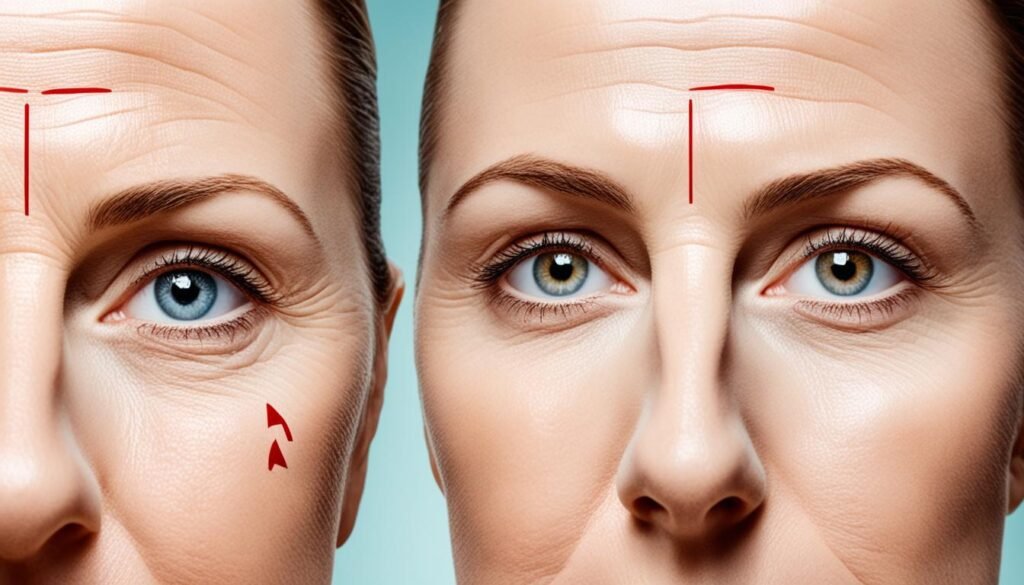
Chronic stress can have a significant impact on the health of our skin. It is well-known that stress can worsen various skin conditions, including eczema, psoriasis, acne, and rosacea. When we experience stress, our body releases stress hormones that can trigger inflammatory responses in the skin. This inflammation weakens the skin’s barrier function, making it more susceptible to flare-ups and exacerbation of existing conditions.
For individuals with eczema, stress can lead to increased itchiness, redness, and irritation. Similarly, those with psoriasis may notice an increase in plaque formation and scaling during stressful periods. Acne-prone individuals may experience more frequent breakouts and longer-lasting pimples due to stress-induced hormonal changes. Additionally, individuals with rosacea may experience heightened facial redness and flushing when under stress.
Managing stress is key to alleviating stress-related skin conditions. Stress reduction techniques such as meditation, deep breathing exercises, and yoga can help regulate the body’s stress response and reduce inflammation. It is also essential to seek appropriate medical treatment for chronic skin conditions, including working closely with dermatologists to develop personalized treatment plans.
By prioritizing stress management, individuals can help minimize the impact of stress on their skin. Taking the time to care for both mental and physical well-being can result in healthier, calmer skin.
Common Stress-Related Skin Conditions and Symptoms
| Condition | Symptoms |
|---|---|
| Eczema | Itchiness, redness, dryness, and irritation |
| Psoriasis | Plaque formation, scaling, and inflammation |
| Acne | Increased breakouts, persistent pimples, and inflammation |
| Rosacea | Facial redness, flushing, and sensitivity |
Managing stress through various techniques and seeking proper medical care can significantly improve the symptoms associated with stress-related skin disorders. Prioritizing stress reduction and self-care can contribute to the overall well-being of not only our skin but also our mental and emotional health.
Holistic Approaches to Stress Management

Taking a holistic approach to stress management is essential for promoting overall well-being and maintaining healthy skin. Incorporating alternative therapies and making lifestyle changes can significantly reduce stress levels and improve skin conditions. Here are some holistic methods of stress reduction:
Yoga
Yoga combines physical postures, breathing exercises, and meditation to promote relaxation and reduce stress. Regular practice of yoga can help calm the mind, relieve tension in the body, and improve overall well-being.
Acupuncture
Acupuncture is an ancient Chinese therapy that involves inserting thin needles into specific points on the body to restore balance and promote healing. It has been found to be effective in reducing stress, anxiety, and pain.
Aromatherapy
Aromatherapy uses essential oils extracted from plants to promote relaxation and reduce stress. Inhalation or topical application of essential oils can have a calming effect on the mind and body.
Herbal Remedies
Herbal remedies, such as chamomile, lavender, and passionflower, have been used for centuries to reduce stress and promote relaxation. They can be consumed in the form of teas or taken as supplements.
Aside from alternative therapies, making positive lifestyle changes can also contribute to stress reduction:
Prioritize Self-Care
Taking time for self-care activities, such as practicing mindfulness, engaging in hobbies, or indulging in a relaxing bath, can help alleviate stress and improve overall well-being.
Practice Gratitude
Expressing gratitude for the positive aspects of life can shift focus away from stressors and promote a more positive outlook. Practicing gratitude daily, such as through journaling or verbal affirmations, can be beneficial.
Foster Healthy Relationships
Building and maintaining supportive relationships can provide a strong foundation for stress management. Surrounding yourself with positive and understanding individuals can help alleviate stress and provide emotional support.
Conclusion
Stress is a significant contributor to premature skin aging, as it triggers hormonal changes, inflammation, and oxidative stress, leading to the breakdown of collagen and elastin, wrinkling, and sagging skin. However, the good news is that stress-induced aging can be reversed through effective stress reduction techniques and lifestyle changes.
By managing stress through practices such as mindfulness meditation, exercise, and adequate sleep, individuals can lower stress hormone levels, reduce inflammation, and promote overall skin health. Adopting a healthy lifestyle, including a well-balanced diet and regular exercise, not only supports optimal skin aging but also improves overall well-being.
Additionally, incorporating appropriate skincare products and techniques can further slow down the signs of premature skin aging. Using skincare products that contain antioxidants, moisturizers with ingredients like hyaluronic acid and retinol, and indulging in stress-relieving skincare rituals can help protect the skin from oxidative stress and maintain its hydration and elasticity.
By implementing these stress management strategies, adopting a healthy lifestyle, and utilizing the right skincare products and techniques, individuals can effectively combat stress-induced aging, delay the onset of wrinkles and sagging skin, and promote overall skin health and vitality.
FAQ
How does stress contribute to premature skin aging?
Chronic stress triggers the release of stress hormones, causing inflammation and damage to the skin’s DNA and cells. It also leads to oxidative stress and shorter telomeres, all of which contribute to premature skin aging.
What role do stress hormones play in skin aging?
Stress hormones, such as cortisol and adrenaline, can decrease collagen production, impair wound healing, and increase the breakdown of collagen and elastin, leading to wrinkles and sagging skin.
How does inflammation impact stress-induced skin aging?
Chronic stress can induce inflammation, damaging skin cells and accelerating the aging process. Inflammatory markers can increase in response to stress, contributing to skin damage.
What is the link between telomeres and stress-induced aging?
Chronic stress is associated with shorter telomeres, which are protective caps on the end of chromosomes. Shortened telomeres are a marker of biological aging and have been linked to an increased risk of age-related diseases.
Can stress reduction help slow down skin aging?
Yes, managing and reducing stress can have positive effects on skin aging. Engaging in stress reduction techniques like mindfulness meditation, exercise, and adequate sleep can lower stress hormone levels, reduce inflammation and oxidative stress, and promote overall skin health.
How does lifestyle affect skin aging?
Adopting a healthy lifestyle with a well-balanced diet rich in antioxidants, regular exercise, adequate sleep, and stress management is essential for healthier and younger-looking skin.
How can skincare help combat stress-induced aging?
Using skincare products with antioxidants, moisturizers, serums, and stress-relieving rituals like facial massages or aromatherapy can protect the skin from stress-related damage and promote relaxation.
Is professional help necessary for stress management?
In some cases, working with a therapist or counselor can provide strategies and techniques for stress reduction, such as cognitive-behavioral therapy, relaxation techniques, and mindfulness-based stress reduction.
Can stress worsen chronic skin conditions?
Yes, chronic stress can trigger inflammatory responses and weaken the skin’s barrier function, leading to flare-ups and worsening of conditions like eczema, psoriasis, acne, and rosacea.
Are there holistic approaches to stress management?
Yes, practices like yoga, acupuncture, aromatherapy, and herbal remedies can help reduce stress levels and improve skin conditions. Making lifestyle changes, practicing self-care, gratitude, and fostering healthy relationships can also have a positive impact on stress reduction.
How does stress contribute to premature skin aging?
Chronic stress triggers the release of stress hormones, causing inflammation and damage to the skin’s DNA and cells. It also leads to oxidative stress and shorter telomeres, all of which contribute to premature skin aging.

